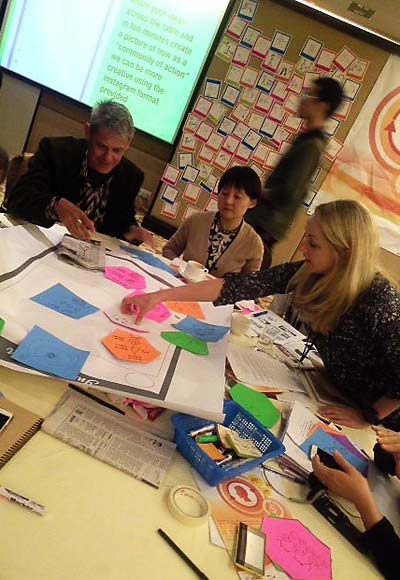Changing Consumer Choice: Experts Gather to Ensure a Future for Endangered Species
Hong Kong, 11th March 2016—More than 100 behaviour change experts and practitioners met this week in Hong Kong to formulate innovative approaches and action plans to change the knowledge, attitudes and practice of consumers of illegal wildlife products.

Participants from approximately 60 organizations across the globe represented diverse professional and research experience on influencing consumer choice and a wide spectrum of markets, economies and cultures.
“This was a groundbreaking gathering of demand reduction experts, and we’re confident that between us, we have made great progress in establishing the collaborations and strategies that are needed to prompt major changes in consumer buying behaviour” said Steven Broad, Executive Director of TRAFFIC.
By examining recent research on behaviour change in fields beyond conservation, attendees considered innovative ways to influence consumer choice. Success stories, challenges, lessons learned and insights arising helped to promote fresh thinking around messaging and messengers being used across the sector. This catalysed the development of wide ranging commitments such as co-ordinating approaches to developing research methodologies and gaining consumer insight; and developing a community of practice around how best to change purchasing preferences, buyer behaviour and potential consumer intentions.
“The energy and knowledge shared this week are essential to help us all work together more strategically to stop the demand for wildlife products and save wildlife,” said Dr Mary Rowen, Senior Biodiversity Advisor for USAID.
“Demand reduction plays a crucial role in tackling poaching and wildlife trafficking along the entire illegal trade chain. This meeting has highlighted very important lessons learned from previous approaches to change consumer behaviour, which we now need to incorporate systematically into the design of future efforts,” said Klemens Riha of GIZ, Coordinator of the German Government’s global “Polifund” project to combat poaching and illegal wildlife trade.
Next steps will include finalizing the strategic actions agreed to improve complementary approaches to tackle consumer interest in illegal wildlife products, including for medicinal, speculation, investment and social status purposes.
This week’s meeting was convened by TRAFFIC and received financial support from the United States Agency for International Development (USAID), through the IUCN and TRAFFIC-led Wildlife TRAPS Project, GIZ on behalf of the German Federal Ministry for Economic Cooperation and Development (BMZ) and the German Federal Ministry for Environment, Nature Conservation, Building and Nuclear Safety (BMUB) and Defra, plus additional support from the World Bank and partner organization WWF.
Notes:
This week’s meeting was convened by TRAFFIC and received financial support from the United States Agency for International Development (USAID), through the IUCN and TRAFFIC-led Wildlife TRAPS Project, GIZ on behalf of the German Federal Ministry for Economic Cooperation and Development (BMZ) and the German Federal Ministry for Environment, Nature Conservation, Building and Nuclear Safety (BMUB) and Defra, plus additional support from the World Bank and partner organization WWF.
About USAID

The United States Agency for International Development (USAID) is responsible for the majority of overseas development assistance from the United States Government and works to end extreme poverty and promote resilient, democratic societies while advancing security and prosperity for America and the world. www.usaid.gov/



